IPC2025 activities by the IUSSP Panel on on Population Registers, Human Rights and EthicsBrisbane, Australia, 14-18 July 2025
The IUSSP Scientific Panel on Population Registers, Human Rights and Ethics organized two sessions at the 30th International Population Conference in Brisbane, Australia 13-18 July 2025: a Research Leader Session on the Future of Population Registers Systems on 14 July and a regular session on Population Registers, Human Rights and Ethics on 15 July. The Panel also held an internal workshop with the fellows.
Nearly all the ‘team’ members travelled to Brisbane to take part in the IUSSP Panel’s sessions more generally the IPC2025 conference: Romesh Silva (UNFPA), the chair of the IUSSP Panel, Sofia Gruskin and Laura Ferguson (Institute on Inequalities in Global Health, University of Southern California) and Keith Breckenridge and Jonathan Klaaren, WISER, University of the Witwatersrand. They were joined the IUSSP fellows Georges Macaire Eyenga (WISER) and Elizabeth Nansubuga (Makerere University), who presented papers in one of the sessions, and – remotely – by Janaina Costa.
IPC2025, Session 43 - Research Leader Session on the Future of Population Registers Systems This session, chaired by Laura Ferguson, included 4 presentations (including one virtual).
Although key components of digital public infrastructure, many ethical and human rights questions arise in the context of population data systems, including legal identity systems and population register-based systems. Drawing on perspectives from law, public policy, history, demography, and public health, this research leader session aimed to (i) review how demographers, population scientists and others have been assessing the coverage, quality and inclusiveness of such legal identity and population register-based systems, (ii) use country case studies to identify and consider strategic and technical questions that are emerging in in the modernization of these systems and discuss (iii) the broader implications for who is counted and who is not, as well as trust in population data systems and questions of access, equity and inclusion in health systems, public benefit systems and banking/finance systems in a world of increasing demographic diversity and fast changing population dynamics.
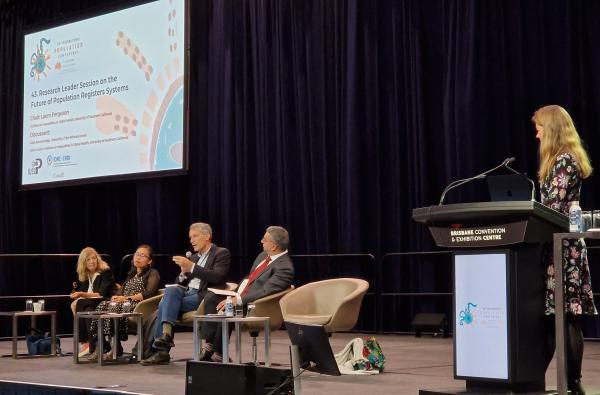
Romesh Silva laid out the complexity of these systems, the challenges of ensuring inclusivity across population groups and the ranges of different ways in which population registers are used. Highlighting technological advances being deployed for population register systems, he noted the need to improve the concepts and methods around their inclusivity. Other panelists provided examples of how these issues are playing out in different country settings. Diego Iturralde provided an overview of the current context in South Africa, introducing the important notions of quality assurance and public trust, and highlighting how engaging with people who have faced challenges using population register systems can help improve them. Providing historical context for the South African context, Jonathan Klaaren spoke about how the census, population register and identity management system have evolved, shaped for decades by racial discrimination and more recently by investments in digital public infrastructure. Winida Albertha shifted the discussion to Indonesia and described the ambitious government initiative, ‘One Data Indonesia’, which provides the framework for national data integration across multiple sources. She underscored the importance of data quality, data security and human resource capacity to ensure an effective approach to national data initiatives.
The discussion that followed the panel was wide-ranging. Sofia Gruksin highlighted several key issues for consideration arising from the presentations including the importance of understanding the original purpose for which a system is developed, who within the national government is responsible for it, how system effectiveness is being assessed and who is accountable to whom for all this work. Additional discussion topics based on questions from the audience included the advantages and disadvantages of using a census as the baseline for population registers, the importance of understanding why some people choose not to be counted and how to prioritize among the plethora of issues requiring attention.
This session raised key questions about how to ensure that population register systems can be inclusive, trusted and appropriately used. Important decisions are being made across countries as to how modernization of population register systems, with important implications for inclusivity and data quality, and additional work is needed to ensure appropriate attention to human rights and ethics in this decision-making.
This session, organized by the IUSSP Panel, was chaired by Sofia Gruskin, and included 4 papers on 4 different countries: South Africa, Cameroon, Indonesia and Uganda.
Grounded in the Sustainable Development Goals, and other international frameworks and targets, this session focused on legal identity systems, and population registers, and how these can offer the opportunity to advance inclusive societies. The presentations illustrated how, in the past few decades, countries around the world have worked to modernize their population register systems as part of broader efforts to advance inclusive legal identity systems. These systems are core parts of digital public infrastructure through which health, social and economic service delivery can be facilitated. But, as apparent from all presentations, there are persisting gaps – who gets counted, how, when, and for what purpose. Each speaker highlighted how attention to human rights norms and ethical standards are essential to any discussion of registry systems. The presentations clarified that it is in fact insufficient to think about registry systems on their own, in that explicit attention must be given to the broader legal, economic, social, cultural and political environment that enables access – or not – to these modern systems. Panelists discussed issues of inequality and exclusion, as well as the ability, and potential, of registration systems to uplift individuals, families, and communities.
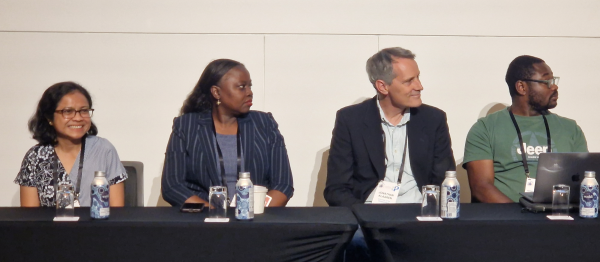
After the presentations, a lively discussion with the audience led by Romesh Silva followed with a focus on how, once systems are in place, initiatives are needed to address the systemic and intuitional gaps that come to light– especially ones rooted in racism, sexism, forced migration, and resistance to diverse family structures. It was agreed therefore that attention is needed not only to the potential for bias in the creation of a system, but also the human rights and ethical issues that may surface at every step along the way – from the creation of the system all the way through to the use of the data collected.
With respect to future directions and next steps, participants all agreed on the need to ensure explicit attention in any such conversations going forward to addressing the key ethical and human rights issues needed to create and deliver inclusive population registries that “leave no one behind,” and that this requires commitment to ensuring they are developed and implemented in ways that promote inclusion, fairness, and respect for all individuals. Issues of discrimination, consent, accessibility and acceptability of the system in place including data privacy and security issues, all require sustained attention not only for researchers, but for anyone engaged with population registries in any way, shape or form. For these needed changes to happen will require sustained attention, political will and sufficient funding for the requisite questions to be asked, analyses to be conducted, and changes to be made.
Fellows' workshop and mentoring The Panel convened throughout the meeting on the sidelines of the IPC in Brisbane to mentor and support the Fellows, take stock, finalize a workplan and make concrete headway on some agreed-upon deliverables. The Panel also used this time to review the proposed new directions of the work of the three fellows and to mentor them on next steps: George Macaire Eyenga on Population Registers, AI, and Ethics in Cameroon; Elizabeth Nansubuga on the Exclusion of “Fatherless” Persons from Birth Registration & National Identity Systems in Uganda; and Janaina Costa on the ongoing digitization of identity systems in a comparative study of Brazil and South Africa. The Panel also finalized plans for its work in the year to come, which includes a series of exciting activities, presentations and publications. The major focus areas for the ongoing technical work of the panel will focus on the ethics and human rights implications of digital systems connected to the climate change crisis, public health and sexual and reproductive health issues.
The Panel members also seized the opportunity to attend sessions or set up meetings with other colleagues interested in or working on various aspects relevant to the project: Angus Amasone (Tuvalu statistics) and a colleague; Jane Wakeford from the Australian Bureau of Statistics, for her work on linking data among databases and presenting it at a fairly granular level; and Winida Albertha (BPS - Statistics Indonesia) and Lilipramawanty Liwin (Deakin University), who presented in each of the Panel's two sessions and provided the Panel members with some more depth on the Indonesian situation.
This project is carried out with the aid of a grant from the International Development Research Centre, Ottawa, Canada. 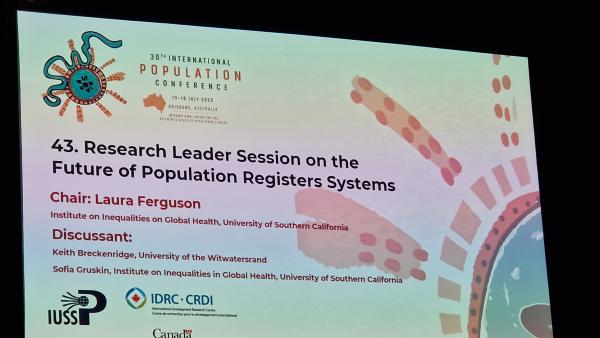
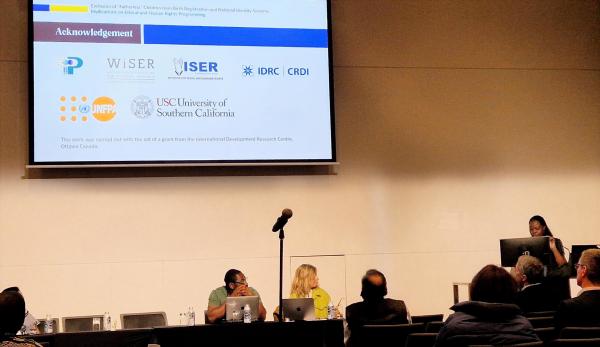
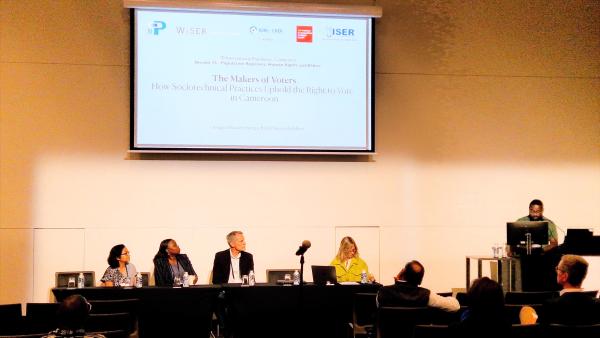
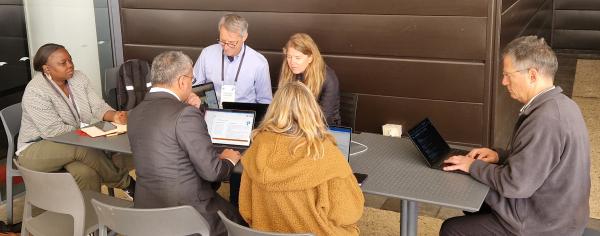
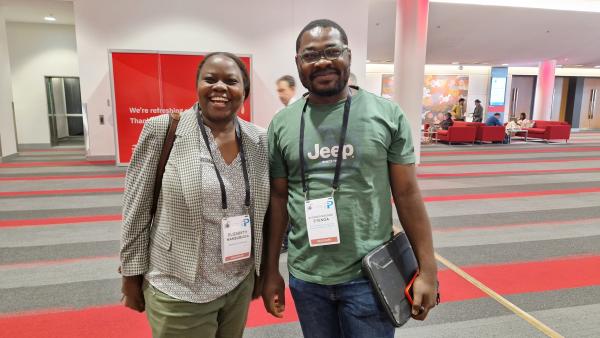
|
